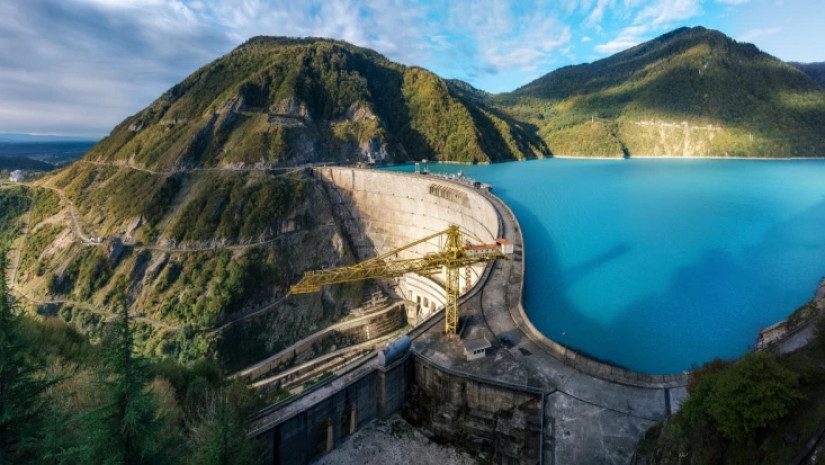Regulatory HPPs – Guarantee of Energy Independence
Nugzar Beridze, Director of the Electricity Department of the Georgian National Energy Regulatory Commission (GNERC), talks about the potential for the development of Georgia's electricity generation sources and how important it is to intensify the construction of res in the country.
- What percentage of electricity consumed in Georgia in the first quarter of 2020 was imported and from which countries?
- In the first quarter, the share of import was 12-15%. The main importing countries are Russia and Azerbaijan. Of course, the share of Russia comes mainly on Abkhazia, while Azerbaijan leads in the rest of Georgia in terms of import.
- Why has import increased if quarantine has been announced in the country since the end of February and consumption has sharply decreased?
- Consumption has not decreased significantly. The main focus was on household consumption, while consumption at the expense of production capacity was reduced by some percentage. We must remember that the first quarter is deficient and it is mostly satisfied at the expense of imports. Hydro resources are reduced during this period, the volume of water reservoirs can no longer ensure the operation of regulatory hydropower plants. We also have gas limits, so importing electricity in the first quarter is essential. The increase in imports in the first quarter of 2020 was mainly due to increased consumption in 2017, 2018 and 2019. In 2017-2018, consumption was increased by 7-8%, the consumption was increased in 2019 too, and in the beginning of 2020, there was a decrease, but not so dramatic, which could significantly change the picture.
- What sources of electricity do we have in Georgia and what percentage of the total generation is regulated by regulatory HPPs?
- Hydropower resources are leading in Georgia, but we have only 20% of them. Consequently, hydrogenation has a large share. Thermal power plants take about 20% of the total generation, up to 80% is hydropower generation, and wind and solar energy have a certain percentage. We have a wind power plant in Gori with a capacity of 20.3 mega-watt. The Gardabani 2 thermal power plant, which has a high efficiency coefficient, has been put into operation this year, but hydropower plants remain the most important source of our generation.
- According to the decision of the Georgian State Electric System (GSE), from May to July, generation facilities will not be able to conclude direct contracts for the sale of electricity, as consumption in the conditions of coronavirus pandemic is significantly reduced. The situation is similar in neighboring countries and exports will not be possible. Under such conditions, regulatory hydropower plants remain in a privileged position, with the possibility of accumulating hydro resources. How important is the construction of regulatory hydropower plants in Georgia?
- Regulatory HPPs are much more flexible in operation, as hydro resources are renewable, the accumulation of which is important because its watering period is short and the resource can be used effectively only through regulatory HPPs. As for seasonal power plants, when we have a large amount of hydro resources. It is difficult to use them. Therefore, it is important for dam power plants to store water and use it when resources are scarce.
- Small and seasonal HPPs cannot replace regulatory HPPs - Should priority be given to the construction of dam hydropower plants?
- No, of course. Dam hydropower plants have a much greater impact on nature than small plants. At this time, it is necessary to occupy more area with reservoirs, as a result of which land, forests and sometimes even villages are flooded. As for river hydropower plants, they have less impact on the environment. Therefore, this process is complex and it is wrong to prioritize and focus on any one, but we cannot solve the problem of electricity shortage without regulatory hydropower plants. Development of wind and solar power plants are also important.
- Many ecologists criticize HPPs. How ecologically clean do you think the energy generated by hydropower plants is?
- HPPs are generally considered to be renewable energy sources and their construction is encouraged, but the environment, of course, is damaged. The trend is that hydropower is a clean resource, free from gas emissions, and environmentally friendly. In terms of environmental impact, all of this needs to be done using appropriate mitigation measures. Everything has an impact on the environment, including wind and solar power plants, the main thing is that this impact should be properly assessed and adequate measures be taken.
- Shuakhevi HPP was put into operation. How important is the construction of Nenskra HPP in terms of import substitution? - The pandemic will end and consumption will increase again.
- First of all, we must say that without the use of energy, we will not be able to develop enterprises and the economy. We need to develop sources of generation because consumption is increasing and local sources can no longer meet it, so we often need to import electricity. As you know, powerful hydropower plants with reservoir are very important for the more efficient introduction of other variable generation sources, and if hydropower plants will be developed too, this will have a great advantage. Import has significantly grown because our generation can no longer cover consumption. Consequently, only powerful power plants can develop the industry and economy of the country.
- What is the experience of foreign countries in this direction? For example, in Norway there are 1660 HPPS. From them, more than 1000 are reservoir HPPs. Should Georgia share this experience?
-In this regard, sharing the experience of Norway will certainly be useful for Georgia. They have fully taken advantage of the hydro resources, while we use only 20%. We always acknowledge with their experience and they, as consultants, are actively involved in this process. Therefore, sharing the experience of Norway as one of the most powerful energy countries in Europe will definitely help us.











